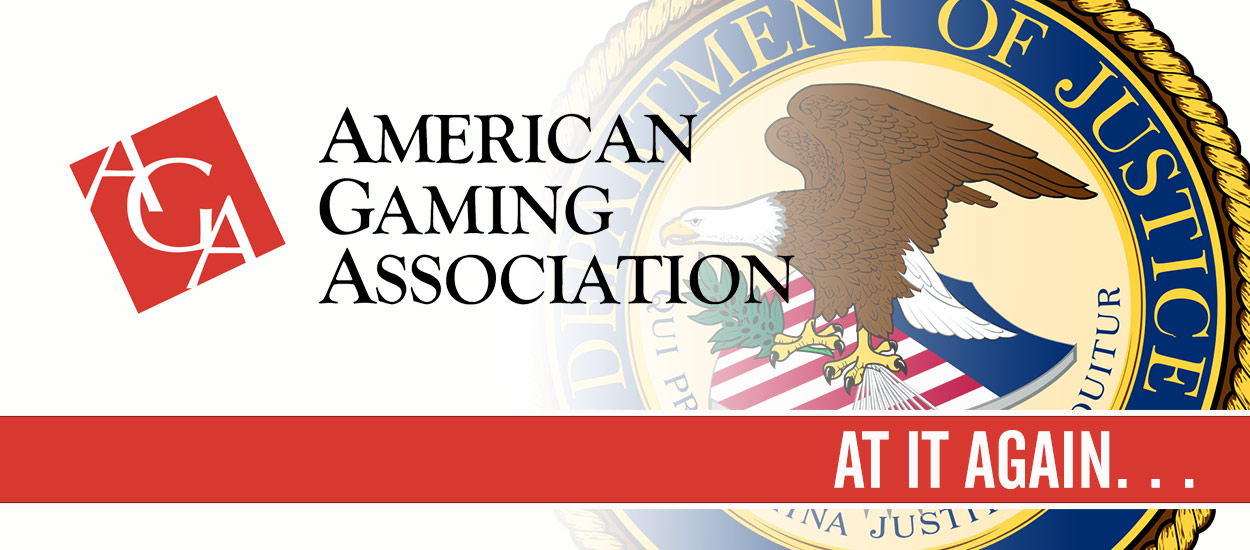AGA says Offshore Sportsbooks, Casinos and 'Skill Game' Machines Pose Threat to American Consumers
Recently, the American Gaming Association (AGA) called on the U.S. Department of Justice (DoJ) to crack down on "illegal" online sportsbooks and casinos and unregulated "skill game" machines.
"While the challenge of illegal gambling is not new, the brazen and coordinated manner in which it occurs—both online and in communities—has elevated this problem to a level that requires significant federal attention," AGA President and CEO Bill Miller wrote. “We urge the Department to make it a priority to act . . . to protect American consumers, crack down on illegal operators, and enforce federal regulations."
The AGA letter outlines the pervasive nature of illegal gambling and the threat unregulated operators pose to consumers, state economies and the legal gaming industry as part of the association's ongoing initiative to stamp out the illegal market.
The AGA urges the Department of Justice to address online gambling by:
- Continuing to educate consumers on legal gaming options and the dangers associated with illegal operations.
- Investigating and indicting the largest offshore operations, such as Bovada, MyBookie and BetOnline, which were mentioned in the letter, that openly violate state laws.
- Clarifying that "skill-based" machine manufactures must comply with Johnson Act registration requirements and anti-money laundering standards and pursuing aggressive enforcement actions against those entities that do not fully comply.
The AGA is back at it
In the letter two weeks ago to Attorney General Merrick Garland, the AGA is calling for new prosecutions of the online gaming operators that are currently operating offshore. This has been an ongoing plea by the AGA for more than a decade, but has intensified since the Federal Government overturned PASPA in May 2018 and the AGA's support of U.S. regulation in sports betting.
The arguments from the AGA do speak to the reality of unregulated online gambling. When it comes to unlicensed gaming in the U. S., there are some unscrupulous operators that have taken advantage of players or worse, shut down while stealing customer's funds. While Miller would like the DoJ to be more active in helping customers be more informed and educated about licensed and regulated gaming options, and some of the risks involved with using rogue operators, the DoJ will still be of no assistance to players who are bilked by less-than-honest operators.
In working with Offshore Gaming Association and its research and services, customers do have a partner on their side to help facilitate any issues that arise, including potential payouts. While the AGA would like to see more offshore operators shut down, yet another crackdown is unlikely to happen and, as in prior efforts, will most likely will have no shot of stopping a single bet.
The AGA and online gambling
It noted too that it's unlikely that the Department of Justice will take any actions regarding Miller’s letter. This has been going on since 2006 when the passage of the Unlawful Internet Gaming Enforcement Act (UIGEA) forced several of the top online gaming companies in the world, including 888, WWTS, Bowmans and PartyPoker to shut down, sell or at least leave the U.S. market entirely. 2006 was also the year that the DoJ arrested BetOnSports CEO David Carruthers, in the first domino to fall taking down what was arguably the biggest sportsbooks in the world at that time. The AGA had until that time advocated that casino gambling and poker could move online, but after the UIGEA took effect, the AGA sat on the sidelines, with a notably 'neutral' stance on the issue. The casino advocacy group took it's lead from one of it's biggest donors, Sheldon Adelson, a staunch opponent of online gambling, and did nothing pro or con for nearly five years.
The AGA had until that time advocated that casino gambling and poker could move online, but after the UIGEA took effect, the AGA sat on the sidelines, with a notably 'neutral' stance on the issue. The casino advocacy group took it's lead from one of it's biggest donors, Sheldon Adelson, a staunch opponent of online gambling, and did nothing pro or con for nearly five years.
In 2011, the DoJ again struck again in what is commonly known as "Black Friday", seizing the dotcom addresses of PokerStars and Full Tilt, effectively ending the huge surge that online poker companies had enjoyed since Chris Moneymaker put Internet poker on the map with his satellite win online and subsequent gold bracket in the WSOP. Not only were the largest online poker websites shut down, every online gambling company moved out of U.S.-based website registrations and the dot ag's, dot lv's and other nondescript domain extensions were employed by other offshore gambling operators looking to avoid seizure of their domains as well.
This time the AGA did use their platform to again advocate for online gambling regulation in the U.S., while noting that the DoJ efforts against several other Internet gambling companies, "hundreds of illegal, offshore Internet sites are still operating." The AGA urged Congress at that time to "modernize and strengthen" both the Wire Act and the UIGEA to eliminate illegal Internet gambling. But the AGA also reminded Congress of their duty to establish federal guidelines to keep minors from gambling online, prevent fraud and money laundering, address problem gambling and ensure players aren’t being cheated.
The Wire Act was overturned for many forms of gambling in 2017 and when PASPA fell the following year, the AGA again shifted its focus, despite outcry from Adelson. Now the AGA is clearly going on the offensive again. Unfortunately, instead of just focusing on their previous valid arguments, they have now fired another round of warning shots at offshore operators.
Prohibition doesn't work
The offshore gambling industry has been around for nearly 25 years. Many of the top sportsbooks in the world operate legally in their jurisdictions and have weathered the storms of U.S. prohibitions many times before. Jay Cohen was convicted, David Carruthers went to jail and domains have been seized, yet the industry continues in jurisdictions outside the United States.
Since the start of regulated betting in New Jersey in 2019, customers have flocked to U.S.-based sportsbooks in droves. Offshore operators have reported new challenges in finding new customers and have struggled to retain many smaller, 'recreational' bettors who fuel coffers and allow for larger sportsbooks to take bigger bets and sharper action. In other words, the "massive illegal sports betting market" outlined in the letter from the AGA is dwindling all on its own.  As states start legalizing sports betting and eventually more online casinos, a lot of these companies considered illegal may actually look to get licensed, which would create an awkward situation for the AGA. With so many mergers and partnerships, it is not beyond the realm of possibility that some of these grey market operations could sell or partner with AGA members. Think 5Dimes. They purposely settled with the DoJ and cut off U.S. clients with the assurance they would not be blocked if they pursue a U.S. license.
As states start legalizing sports betting and eventually more online casinos, a lot of these companies considered illegal may actually look to get licensed, which would create an awkward situation for the AGA. With so many mergers and partnerships, it is not beyond the realm of possibility that some of these grey market operations could sell or partner with AGA members. Think 5Dimes. They purposely settled with the DoJ and cut off U.S. clients with the assurance they would not be blocked if they pursue a U.S. license.
And what about PokerStars? They were originally banned but paid an enormous fine to the U.S. government and are now part of Flutter, which owns FanDuel. The bottom line is that the lines are not so clearly set that it's in anyone's best interest to burn bridges with legitimate offshore operators who have shown decades of reliable service for gamblers, despite little or no regulation.
A better solution might be what Ontario did at the encouragement of the Canadian Gaming Association, where companies with a proven track record, meeting all regulation requirements of states related to underage betting, problem gambling, etc. can get a license from a state to continue operating legally if they agree to pay a licensing fee, tax and implement geolocation requirements of that state.
That seems to be the way every country except the U.S. is moving. It's that way in Ontario, the UK, Germany, Spain, Brazil and a slew of other jurisdictions.
Costa Rica, Antigua, Kahnawake, Malta, etc. aren't the United States' enemies. It's not the fault of the companies there for existing, which the AGA is inferring. And it also shouldn't be forgotten that the World Trade Organization's ruling that the U.S. is in violation of an international treaty still holds true even if the U.S. prefers to disagree with the ruling and thus ignores it.
The AGA also refences a 2020 Survey of American Sports Bettors conducted by Heart + Mind Strategies. The survey notes that the illegal sports betting business is down 25%, but says that offshore operators are up 3%. The survey says 55% of bettors who are playing offshore believed they were playing legally at the time and that 48% of bettors would change their behavior if they learned it was illegal.
Alternatives
For starters, what the AGA should be doing is making it easier for players to know where they are playing. A good place to start would be to maintain a list of licensed operators. As with other social issues, education is also a key. The AGA could let existing players know that if they gambled online prior to 2019, they are most likely not playing with a licensed U.S. sportsbook or online casino.
And finally, instead of spending funding and wasting time with rhetoric of an attempt at a new prohibition, perhaps regulated operators should know why players are staying with an offshore operator. Maybe a 2022 AGA-funded study could focus on that and share data with licensed operators. If U.S. gambling companies can make a better online product, they would end up with all of the players.
The online gambling market is going to end up being in the hundreds of billions of dollars, so perhaps the AGA should look forward to what the industry will look like in the U.S. in 10 years, instead of looking back and launching another futile effort to eliminate the established competition.
OSGA writers FairwayJay and Hartley Henderson also contributed to this article.








































